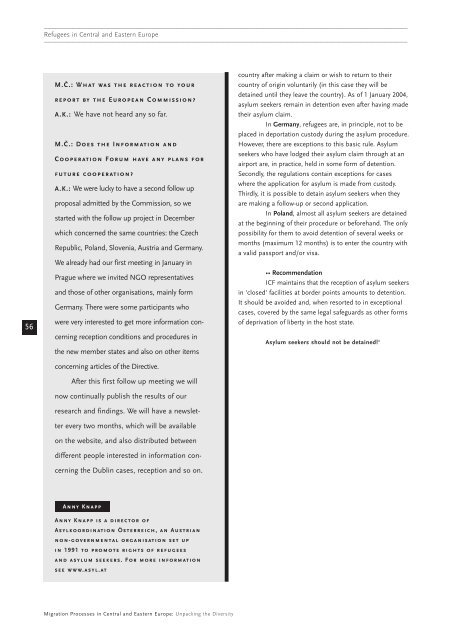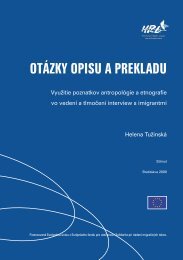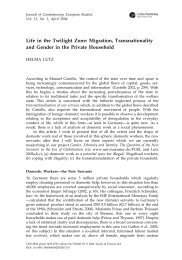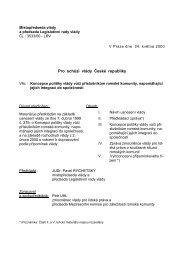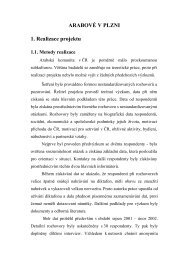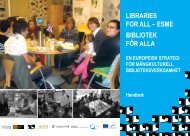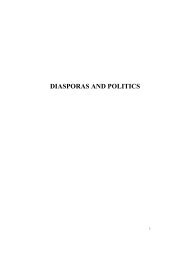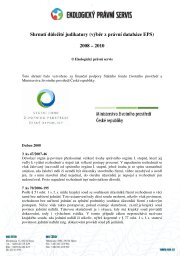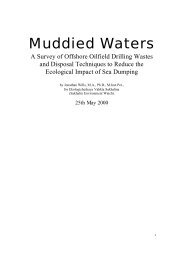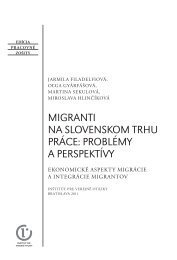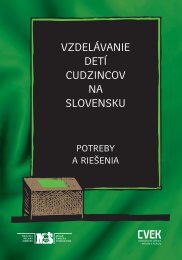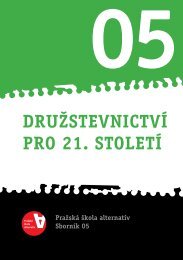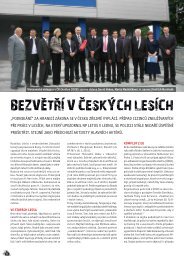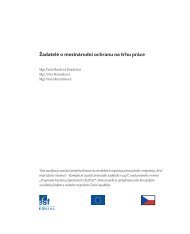Migration Processes in Central and Eastern Europe - Multiple Choices
Migration Processes in Central and Eastern Europe - Multiple Choices
Migration Processes in Central and Eastern Europe - Multiple Choices
Create successful ePaper yourself
Turn your PDF publications into a flip-book with our unique Google optimized e-Paper software.
———————————————————————————————————————————————————————————————<br />
Refugees <strong>in</strong> <strong>Central</strong> <strong>and</strong> <strong>Eastern</strong> <strong>Europe</strong><br />
———————————————————————————————————————————————————————————————<br />
56<br />
M.Č.: What was the reaction to your<br />
report by the <strong>Europe</strong>an Commission?<br />
A.K.: We have not heard any so far.<br />
M.Č.: Does the Information <strong>and</strong><br />
Cooperation Forum have any plans for<br />
future cooperation?<br />
A.K.: We were lucky to have a second follow up<br />
proposal admitted by the Commission, so we<br />
started with the follow up project <strong>in</strong> December<br />
which concerned the same countries: the Czech<br />
Republic, Pol<strong>and</strong>, Slovenia, Austria <strong>and</strong> Germany.<br />
We already had our first meet<strong>in</strong>g <strong>in</strong> January <strong>in</strong><br />
Prague where we <strong>in</strong>vited NGO representatives<br />
<strong>and</strong> those of other organisations, ma<strong>in</strong>ly form<br />
Germany. There were some participants who<br />
were very <strong>in</strong>terested to get more <strong>in</strong>formation concern<strong>in</strong>g<br />
reception conditions <strong>and</strong> procedures <strong>in</strong><br />
the new member states <strong>and</strong> also on other items<br />
concern<strong>in</strong>g articles of the Directive.<br />
After this first follow up meet<strong>in</strong>g we will<br />
now cont<strong>in</strong>ually publish the results of our<br />
research <strong>and</strong> f<strong>in</strong>d<strong>in</strong>gs. We will have a newsletter<br />
every two months, which will be available<br />
on the website, <strong>and</strong> also distributed between<br />
different people <strong>in</strong>terested <strong>in</strong> <strong>in</strong>formation concern<strong>in</strong>g<br />
the Dubl<strong>in</strong> cases, reception <strong>and</strong> so on.<br />
country after mak<strong>in</strong>g a claim or wish to return to their<br />
country of orig<strong>in</strong> voluntarily (<strong>in</strong> this case they will be<br />
deta<strong>in</strong>ed until they leave the country). As of 1 January 2004,<br />
asylum seekers rema<strong>in</strong> <strong>in</strong> detention even after hav<strong>in</strong>g made<br />
their asylum claim.<br />
In Germany, refugees are, <strong>in</strong> pr<strong>in</strong>ciple, not to be<br />
placed <strong>in</strong> deportation custody dur<strong>in</strong>g the asylum procedure.<br />
However, there are exceptions to this basic rule. Asylum<br />
seekers who have lodged their asylum claim through at an<br />
airport are, <strong>in</strong> practice, held <strong>in</strong> some form of detention.<br />
Secondly, the regulations conta<strong>in</strong> exceptions for cases<br />
where the application for asylum is made from custody.<br />
Thirdly, it is possible to deta<strong>in</strong> asylum seekers when they<br />
are mak<strong>in</strong>g a follow-up or second application.<br />
In Pol<strong>and</strong>, almost all asylum seekers are deta<strong>in</strong>ed<br />
at the beg<strong>in</strong>n<strong>in</strong>g of their procedure or beforeh<strong>and</strong>. The only<br />
possibility for them to avoid detention of several weeks or<br />
months (maximum 12 months) is to enter the country with<br />
a valid passport <strong>and</strong>/or visa.<br />
•• Recommendation<br />
ICF ma<strong>in</strong>ta<strong>in</strong>s that the reception of asylum seekers<br />
<strong>in</strong> 'closed' facilities at border po<strong>in</strong>ts amounts to detention.<br />
It should be avoided <strong>and</strong>, when resorted to <strong>in</strong> exceptional<br />
cases, covered by the same legal safeguards as other forms<br />
of deprivation of liberty <strong>in</strong> the host state.<br />
Asylum seekers should not be deta<strong>in</strong>ed! 4<br />
Anny Knapp<br />
Anny Knapp is a director of<br />
Asylkoord<strong>in</strong>ation Österreich, an Austrian<br />
non-governmental organisation set up<br />
<strong>in</strong> 1991 to promote rights of refugees<br />
<strong>and</strong> asylum seekers. For more <strong>in</strong>formation<br />
see www.asyl.at<br />
<strong>Migration</strong> <strong>Processes</strong> <strong>in</strong> <strong>Central</strong> <strong>and</strong> <strong>Eastern</strong> <strong>Europe</strong>: Unpack<strong>in</strong>g the Diversity


